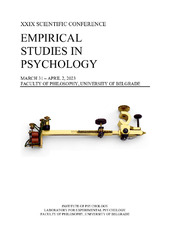| dc.creator | Videnović, Marina | |
| dc.creator | Jolić Marjanović, Zorana | |
| dc.creator | Mojović Zdravković, Kristina | |
| dc.date.accessioned | 2023-12-18T11:14:55Z | |
| dc.date.available | 2023-12-18T11:14:55Z | |
| dc.date.issued | 2023 | |
| dc.identifier.isbn | ISBN-978-86-6427-247-6 | |
| dc.identifier.uri | http://reff.f.bg.ac.rs/handle/123456789/5728 | |
| dc.description.abstract | Broadly speaking, collaborative problem solving (CPS) denotes a joint activity of a dyad or a small group which is directed toward performance or a desired goal state. CPS has been widely recognized as one of the essential 21st-century skills but is nevertheless rarely formally taught or modelled by educators. Thus, it seems that a more systematic approach for developing these skills, through regular curricula with appropriate support and scaffolding by teachers, is needed to produce positive effects on the achievement and social relations of students. The current study sought to investigate the common understanding of collaboration among highschoolers; current findings will serve as one of the inputs for the development of the PEER-model training at school. A total of 31 students (17 female) from six secondary schools in Belgrade were interviewed about experiences and attitudes relating to CPS. Several palpable misconceptions students generally acknowledged that collaboration, which encompasses idea-sharing and argumentation, is an important life skill. Nevertheless, their description of collaboration shows that this process is too often equated with an efficient division of tasks among team members. Next, although
often accentuate the importance of organizational skills, capabilities, and knowledge of (in)formal group leaders. According to students, opposing views are a source of conflict that success. To follow, contrary to findings of extant research showing that teachers are indispensable in enhancing cognitive and group processes in CPS, students often marginalize assessment tasks. Finally, some participants see CPS as appropriate only for younger children or as a tool for fixing grades and earning good
misconceptions of CPS could indeed pose barriers to successful collaboration, which is why any systematic attempt to train CPS skills in school needs to correct these first. | sr |
| dc.language.iso | en | sr |
| dc.relation | PEERSolvers - The PEER model of collaborative problem solving: Developing young people’s capacities for constructive interaction and teamwork | sr |
| dc.rights | openAccess | sr |
| dc.rights.uri | https://creativecommons.org/licenses/by/4.0/ | |
| dc.source | Book of Abstracts, XXIX Scientific Conference Empirical Studies in Psychology, March 31-April 2, Faculty of Philosophy, University of Belgrade | sr |
| dc.subject | collaborative problem solving | sr |
| dc.subject | collaboration | sr |
| dc.subject | misconceptions | sr |
| dc.subject | high school students | sr |
| dc.subject | training | sr |
| dc.title | Common misconceptions about collaborative problem solving among high school students | sr |
| dc.type | conferenceObject | sr |
| dc.rights.license | BY | sr |
| dc.citation.spage | 109 | |
| dc.identifier.fulltext | http://reff.f.bg.ac.rs/bitstream/id/14424/bitstream_14424.pdf | |
| dc.identifier.rcub | https://hdl.handle.net/21.15107/rcub_reff_5728 | |
| dc.type.version | publishedVersion | sr |

